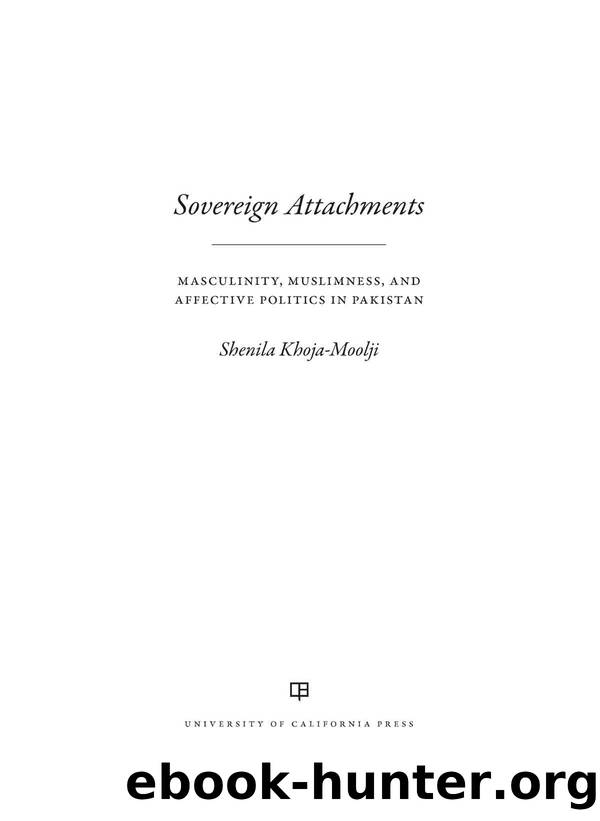Sovereign Attachments by Shenila Khoja-Moolji

Author:Shenila Khoja-Moolji [Khoja-Moolji, Shenila]
Language: eng
Format: epub
ISBN: 9780520336797
Publisher: University of California Press
Published: 2021-06-15T07:00:00+00:00
FIVE
Kinship Metaphors
THE BETI AND BEHAN
IN 2017, THE ARREST OF NINETEEN-YEAR-OLD NAUREEN LAGHARI became a national news sensation in Pakistan. She had left home on the morning of February 10 to attend classes at the Liaquat Medical College in Hyderabad but did not return. Her parents filed a missing persons report with the police. A few months later, four militants were arrested in Lahore for planning to bomb a church on Easter; one of them was a woman later identified as Laghari.
It was found that Laghari had travelled to Lahore with the hope of eventually migrating to âthe land of Khilafah,â as she explained to her brother in a text message.1 She had married a militant, Ali Tariq, joined his network, and at the time of her arrest was expected to blow up a church in a few days.2 During the military raid, Tariq was killed, and while Laghari engaged in a shootout with the police for about an hour, she was eventually captured.3 Surprisingly, she was released a few days later. The representative of the Pakistani army disarticulated her from terrorism and rearticulated her as a âquam-ki-betiâ (nationâs daughter) who had been duped by the terrorists. Laghari therefore deserved protection and not punishment; she was ultimately forgiven.
This chapter surveys a number of cases to illustrate how the state, the Taliban, as well as âthe people,â draw on kinship feelings to create and expand the scope for sovereignty. In particular, threats to the beti (daughter) and behan (sister)âwho are imagined as proxies for the honor of men, the ummah, and the nationâstir up feelings of care and humiliation, providing the affective environment for the sovereign functions of violence, rescue, rebuke, and forgiveness. I begin with a consideration of Laghariâs case to point to how, through the metaphor of beti, she is cast as the daughter of not only her parents but the entire nation. The ISPR utilizes this figuration to furnish itself as the patriarch, binding the nation into a paternal public. This public then legitimizes state violence in the name of protecting the beti. This kinship feeling is so powerful that even women who attack or plan to attack the state but then decide to reform their ways, such as Laghari, are forgiven and folded back into the national family.4 Women who critique the state, however, are not offered such possibilities; they are disciplined. The case of gang-rape victim Mukhtar Mai illustrates how women who do not abide by patriarchal scripts of compliance, which are interlinked with ideal styles of political attachment, are reprimanded. These women become what I am calling the âunruly daughters.â
The Taliban also articulate women through kinship metaphors to cultivate a public that legitimizes their violence. Here, the feminine subject of rescue and protection is the behan, and sometimes the beti, who has been violated, often sexually, by the kuffarâa category that includes both national and imperial Others. Her violation recruits the magazinesâ readership as a fraternal public that views it as a breach of the ummahâs honor and therefore coheres together as a humiliated collectivity.
Download
This site does not store any files on its server. We only index and link to content provided by other sites. Please contact the content providers to delete copyright contents if any and email us, we'll remove relevant links or contents immediately.
| Africa | Americas |
| Arctic & Antarctica | Asia |
| Australia & Oceania | Europe |
| Middle East | Russia |
| United States | World |
| Ancient Civilizations | Military |
| Historical Study & Educational Resources |
Machine Learning at Scale with H2O by Gregory Keys | David Whiting(4312)
Never by Ken Follett(3954)
Fairy Tale by Stephen King(3394)
Oathbringer (The Stormlight Archive, Book 3) by Brandon Sanderson(3213)
The Man Who Died Twice by Richard Osman(3077)
Will by Will Smith(2919)
Rationality by Steven Pinker(2363)
Can't Hurt Me: Master Your Mind and Defy the Odds - Clean Edition by David Goggins(2339)
The Dark Hours by Michael Connelly(2307)
Friends, Lovers, and the Big Terrible Thing by Matthew Perry(2230)
The Dawn of Everything: A New History of Humanity by David Graeber & David Wengrow(2208)
Principles for Dealing With the Changing World Order: Why Nations Succeed and Fail by Ray Dalio(2054)
A Short History of War by Jeremy Black(1848)
HBR's 10 Must Reads 2022 by Harvard Business Review(1842)
Go Tell the Bees That I Am Gone by Diana Gabaldon(1756)
A Game of Thrones (The Illustrated Edition) by George R. R. Martin(1744)
Kingdom of Ash by Maas Sarah J(1677)
515945210 by Unknown(1665)
443319537 by Unknown(1556)
